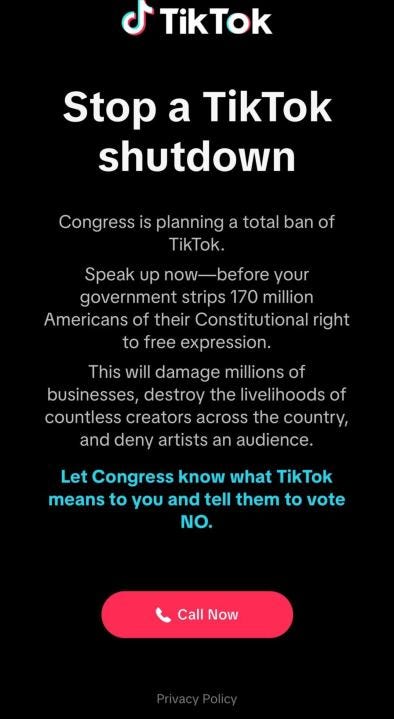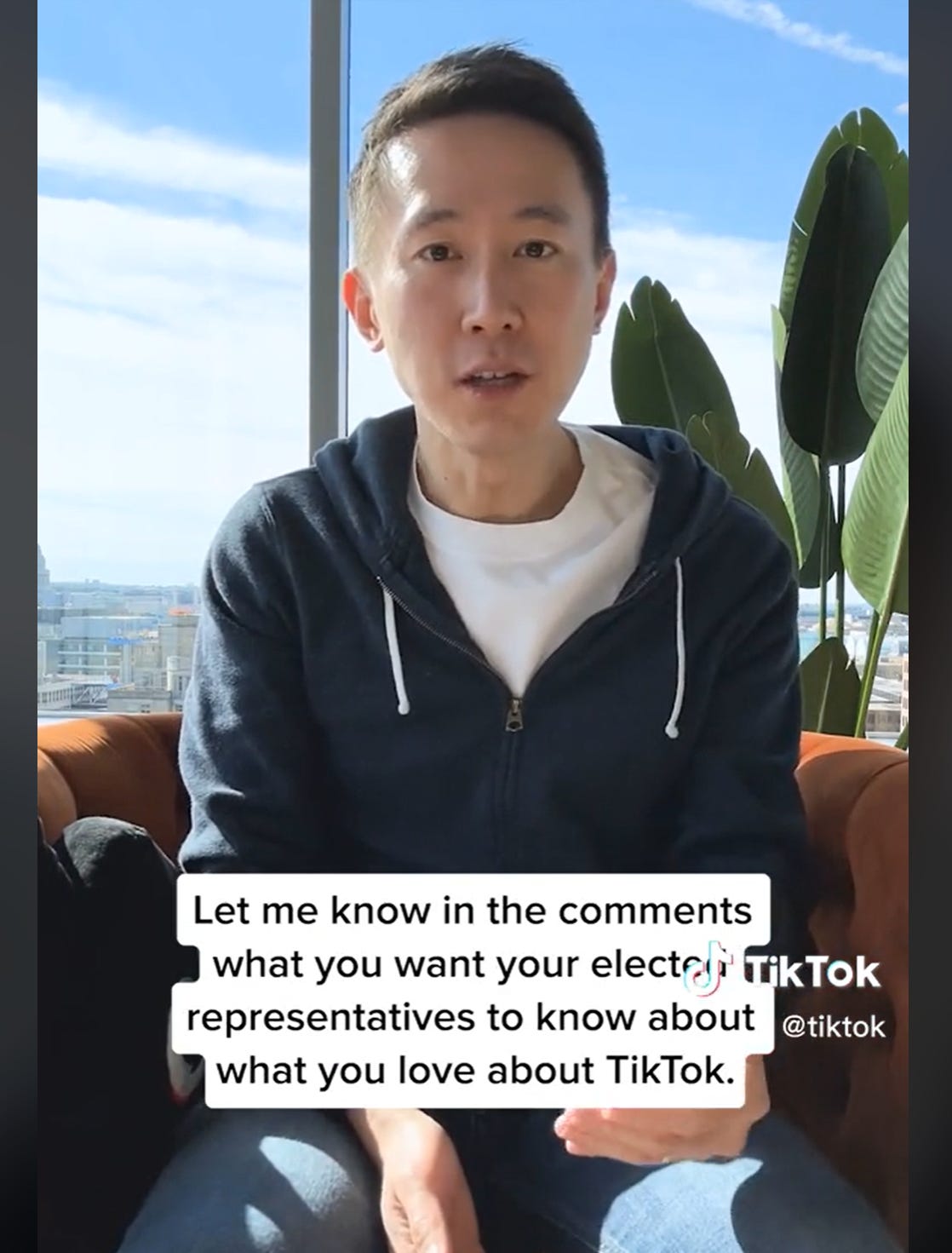13 Arguments for Why the US Should Ban TikTok
Last week was Ban TikTok Week, but in writing up my final post, I found I had too much to say. Surprise, surprise.
Rather than try to fit everything into a single post, it felt like a good opportunity to weave together various threads I’ve been blogging with for the past three years.
I’ve had a few people ask me whether I’m serious about this. Yes, I absolutely am. It would be unprecedented, of course, to ban a media product used by so many people. One gets nervous even contemplating it. But both alternatives — banning and not banning TikTok — are unthinkable.
Someone is going to be build the future. The current technological revolutions and the closing of the long postwar era of Boomer Ballast means that reality is up for grabs; the present battle is ontological. The tech companies are creating a reality of code, of inhuman scale and complexity, one in which the human subject is reduced to a monkey in a Skinner box while the technocapitalists dream of annihilation.
I prefer the liberal ontology, defined by institutions, the rule of law, and the reasoning liberal subject. Clearly, faith in this reality is fading: is it really possible to prosecute Trump? Can we really tolerate being governed by the collective will of our fellow citizens? Do we really accept the outcomes produced our institutions?
Can we really ban TikTok?
That remains to be seen. But here are thirteen reasons why we should,
1. TikTok is addictive — it gets you addicted to posting
This is the central engine of TikTok, and another way in which “the algorithm” is different here than for Uber: creators are actually posting an irrational amount, investing more time and energy than they rationally should, because they are mistaken about the costs and benefits. Going viral is like the high of winning a big bet, or like the high of getting high: it programs you mostly to want to get high again.
2. TikTok has already damaged electoral legitimacy
At the risk of playing Hume, there’s no way to inductively demonstrate that something won’t happen just because it hasn’t happened yet.
Imagine, for the weekend before Election Tuesday, the TikTok algorithm up-ranking videos attacking Biden. Or, for that matter, Trump. Or RFK Jr. By the standards of Russiagate, this would be a disaster for American electoral integrity.
And TikTok has demonstrated that they are willing to use these kinds of platform messages to influence American politics. On March 7, they sent out the following message en masse.
3. TikTok is extracting the behavioral training data we need for the next generation of AI
AI is the new technology of war. Behavioral data is the new oil. TikTok is a Chinese company; we are training their war machines. Meanwhile, China bans our social media platforms, bans its citizens from training our war machines. They’re drinking our milkshake. They’re drinking it up.
4. TikTok is an acceleration of culture — and accelerationism is terrorism
Accelerating change has become both addictive and intolerable. At this point, the balance among stability, change, and tradition has been upset; society has lost both its roots in shared memories and its bearings for innovation…An unlimited rate of change makes lawful community meaningless.
5. TikTok creates runaway attention feedback loops
The positive feedback loop for a given symbol continues to accelerate upwards until it bumps up against some other system, some friction to slow it down or some barrier that stops it. In both cases, significant energy is produced that must be absorbed; the other system has its own homeostatic negative feedback loops, but these can only handle so much before they are denatured or yanked out of equilibrium.
Consumers have no place to go. There’s no collapse, just more and more consumption, running up against and eroding the limits imposed by biology or society. Unless people cease to be fed or sheltered, there’s nothing stopping them from applying more and more intensity and attention to the pixels on their screens, from attaching deeper and deeper importance to the producers and topics on the screen.
6. TikTok trains us to be functionaries
When we communicate via social media, we are not communicating with other people. We are communicating with The Apparatus. But it doesn’t listen. It responds—and trains us to respond back. As we accept the content presented to us, we react as if it were the product of humans rather than human-accounts; we accept our role as operators engaged in what Flusser calls “unconscious functioning.”
7. We didn’t choose Tiktok
We don’t want to live in a world where the only question about technology is the one proposed by the technology companies: “We invented this, take it or leave it.”
8. TikTok obviously isn’t helping
We are unsettled to the very roots of our being. There isn’t a human relation, whether of parent and child, husband and wife, worker and employer, that doesn't move in a strange situation...There are no precepts to guide us, no wisdom that wasn’t made for a simpler age. We have changed our environment more quickly than we know how to change ourselves.
9. TikTok is incompatible with human dignity
Pope Pius XXII: It is not an exaggeration to say that the future of modern society and the stability of its inner life depend in large part on the maintenance of an equilibrium between the strength of the techniques of communication and the capacity of the individual’s own reaction.
Karl Deutsch: When we defend a man’s dignity, we defend his ability to use his personality; we defend him against an intolerably high speed of learning, an intolerable speed of changing his behavior—intolerable, that is, because incompatible with the continuous functioning of his self-determination, his autonomous learning.
Marshall McLuhan: In periods of notable technological change, men lose most of their dignity and autonomy. Electric speed-up of data transmission and retrieval renders the age-old habits and patterns of visually classified knowledge (including our educational, political and commercial establishments) quite hollow and inept…those who struggle to maintain the older patterns of perception and procedure in their lives are automatically deprived of their autonomy and dignity
10. TikTok makes us less creative
“The algorithm’s” job gets easier the more it pacifies both the creators and consumers! At the beginning of TikTok, we saw a creative outpouring with few analogues in history. The democratization of high-quality video content (props legitimately due to TikTok's impressive suite of video filters and sound library) created an outlet for untapped human creative potential.
But “the algorithm” doesn’t care about quality or creativity; it can’t even detect it. It just wants to match consumers and videos. If anything, diversity of content and of taste makes this task more difficult. “The algorithm” is happiest when every viewer is watching the exact same video on repeat: Total Entertainment Forever.
11. TikTok makes science harder
Diagnosing the problem—making it legible to the human actors comprising the social media system who feel their dignity and autonomy eroded but lack the categories to understand why—is necessary for developing new norms and regulations. Social media has shocked every social, economic and political system; until we understand how it continues to shock our knowledge system, we are unable to formulate coherent responses anywhere.
12. TikTok alienates the young from the old
The problem is that the internet is aliens. The exponential growth in information production and circulation has overwhelmed the mature information-processing capacities of adults; the fully armed and operational internet is shaping, molding, creating younger generations. I’m searching for the right word. In Romance languages they say “formacion” to mean something like training and education, and this is what I mean to say. Media forms us, most fully when we are young.
During my lifetime, the internet has penetrated almost every society in the world and converted younger generations into fundamentally different people than their parents and especially grandparents. Maybe this represents progress, maybe this represents decline. I am again agnostic about which is the ideal technosocial environment. But it definitely represents a breakdown of cultural continuity, of the ability of community self-determination.
13. Banning TikTok re-affirms the possibility of democratic control of big tech
I was at a conference where some regulators and platform people were discussing campaign finance on social media. The regulators were all super concerned about targeted advertising. One regulator said that his goal was to require Facebook to provide a list of the demographics at whom each ad was targeted — to see if a given ad were target at women, or Hispanics, or retirees, etc.
The Facebook engineer scoffed. “Do you have any idea how the ad auction at the heart of Facebook works? No one knows who is “targeted,” it’s all in real time and a super complex interaction between supply and demand.” The regulator, with a law background, was clearly out of his technical depth.
What the engineer was saying is true: most people don’t understand these ad auctions and his description was exactly correct. But as I told the lawyer: “Tell them to give you what you want or go to jail! Who cares what bullshit systems they use to maximize the efficiency of serving ads. The law creates reality.”



Go off
As much as I love shooting fish in a barrel, I'm gonna wait to see if anyone else can spot any flaws in this analysis.